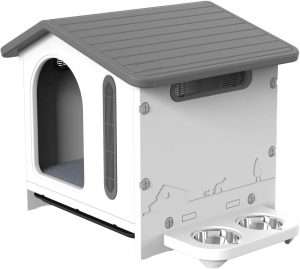
My Dog Won’t Lay Down: 6 Reasons Why and What To Do
-
 By
Alexander Thornton
By
Alexander Thornton
- Last updated: September 9, 2023

Dogs are known for being active and playful, but sometimes they just want to relax. Laying down is a natural position for dogs, but some find it difficult or uncomfortable.
If you notice your dog struggling to get comfortable when they lay down, pay attention to this. It could be a sign of an underlying health problem. Some dog owners shrug it off as they might think their dog is just being lazy, but this isn’t always the case.
Table of Contents
Normal Resting Position For Dogs
Dogs usually sleep on their side or stomach with their legs stretched out behind them. This position is the most comfortable for dogs and allows them to get the best rest possible. Depending on their age and breed, their sleeping and resting positions might be different.
For example, puppies typically sleep on their backs with their legs in the air because they’re still growing and developing. Older dogs might find it more comfortable to sleep in a curled position.
There are many reasons why your dog might not be able to lay down or might not want to. Let’s take a look at some of the potential causes.

1. Arthritis
One of the most common reasons why dogs have difficulty laying down is arthritis. This is especially true for older dogs as they’re more likely to develop this condition. Arthritis is a degenerative disease that causes inflammation in the joints. This can make it difficult and painful for your dog to move around, mainly when they try and lay down.
In older dogs, arthritis isn’t always easy to spot because they tend to adjust their behavior to mask the pain. For example, you might notice your dog is struggling to get up from a lying position or isn’t playing as much as expected. Sometimes, this could also manifest as a change in mood, such as your dog seeming grumpy or irritable.
What to Do if You Suspect Your Dog Has Arthritis
Early diagnosis is always vital when it comes to arthritis. The sooner you can get your dog treatment, the better. If you suspect your dog might have arthritis, then make an appointment with your online or local vet. They’ll be able to carry out some tests and confirm the diagnosis. From there, they’ll be able to recommend the best course of treatment for your dog. This might include medication, physiotherapy, or hydrotherapy.
These treatments may make the inflammation go away, allowing dogs to be able to lay down with ease. Additionally, it can help make any pain more manageable so that your dog can live a comfortable and happy life.
Orthopedic beds are also a great way to help dogs with arthritis. These beds are designed to provide joint support and relief from pain. They usually have a soft, padded surface that’s gentle on your dog’s joints. This takes the pressure off their joints and allows them to get a good night’s sleep.

2. Bloating / Digestive Issues
Another common reason why dogs have difficulty lying down is bloating. Bloating occurs when the stomach fills with gas or air, causing it to expand. This can make it very uncomfortable for your dog, putting pressure on their organs. Additionally, bloating can cause shortness of breath and a feeling of general discomfort.
Dogs who are feeling bloated often feel better when they’re standing up. This is because it takes the pressure off their stomach and allows them to breathe more easily. However, this position isn’t always comfortable or possible for dogs to maintain for long periods.
Other than bloating, other digestive issues such as constipation can also make it difficult for dogs to lay down. This is because they might be feeling pain from their digestive system, making it uncomfortable for them to sit or lie in any position.
What to Do if You Suspect Your Dog Is Bloated
Take the time to learn about the signs and symptoms of bloating in dogs. This way, you’ll be able to identify if your dog is bloated and get them the help they need. If you think your dog might be bloated, first-aid measures such as walking them and massaging their tummy can help.
Feeding them smaller meals can also help move the food along their digestive tract and can prevent bloating from occurring in the first place. However, you should always take your dog to the vet as soon as possible so that your doggie can be treated appropriately.
3. Anxiety or Fear
Think of the last time that you felt anxious or afraid. Chances are, you didn’t feel like lying down because it would make you feel more vulnerable. The same goes for dogs.
Dogs who are anxious or fearful often don’t want to lie down because it makes them feel exposed. This is especially true if they’re in an unfamiliar environment or if they’re feeling threatened. When dogs are in this state, they’re more likely to stay on their feet so that they can be ready to run away or defend themselves if needed.
Laying down means that they can’t see what’s going on around them as easily, and this makes them feel more vulnerable. For some dogs, this feeling is so strong that they might even refuse to lie down at all.
What to Do if Your Dog Is Anxious or Afraid
If you’re introducing a puppy or dog to a new environment, make sure to do it gradually. This will give them time to adjust and get used to their new surroundings.
You should also make sure that there’s nothing in the environment that could be causing your dog to feel anxious or afraid. If there is, try to remove it or put your dog in a different room.
Desensitization and counterconditioning might also be helpful. This is where you expose your dog to the thing that they’re afraid of but in a controlled and safe way. For example, if your dog is afraid of loud noises, you can start by playing soft music and gradually increase the volume over time.
This process takes time and patience, but it can help your dog to overcome their fear. If you’re not sure how to desensitize and counter condition your dog, speak to a qualified behaviorist or trainer for help.

4. Pancreatitis
Pancreatitis is a condition that affects the pancreas and can cause a whole host of problems for dogs. The pancreas is an organ that produces enzymes that help to break down food. When it becomes inflamed, these enzymes start to attack the pancreas itself, causing damage.
Dogs with pancreatitis often have a hard time lying down because it puts pressure on their stomach. This can cause them a lot of pain and discomfort. Additionally, lying down can also make it difficult for them to breathe, as the position puts pressure on their lungs.
Other signs of pancreatitis include a loss of appetite, vomiting, and diarrhea. Observe your dog carefully for any of these signs and take them to the vet as soon as possible if you think they might have pancreatitis.
What to Do if You Think Your Dog Has Pancreatitis
If you think your dog might have pancreatitis, the best thing to do is take them to the vet immediately. Pancreatitis is a serious condition and can be life-threatening if not treated promptly.
At the vet, your dog will likely need to be hospitalized so that they can receive IV fluids and pain medication. They may also need to be placed on a special diet.
After your dog has been treated and is on the road to recovery, they may still have a hard time lying down. This is because the pancreas can take weeks or even months to heal completely. In the meantime, you can help your dog by providing them with a soft bed and making sure that they’re as comfortable as possible.
5. Heart Disease
Heart disease is another condition that can make it difficult for dogs to lie down. When the heart isn’t functioning properly, it can’t pump blood as efficiently. This can cause a build-up of fluid in the lungs, which makes it difficult to breathe.
Dogs with heart disease often tire easily, and they may have a hard time getting up after lying down. They may also cough a lot, especially when they lie down or first get up in the morning.
Prevention is the best medicine when it comes to heart disease. Make sure that your dog is up-to-date on their vaccinations and takes regular trips to the vet for check-ups. You should also feed them a healthy diet and make sure that they get plenty of exercise.
What to Do if Your Dog Has Heart Disease
If your dog has been diagnosed with heart disease, there are a few things that you can do to help them. First, make sure that they’re taking all of their medication as prescribed by the vet.
You should also feed them a low-sodium diet and ensure that they get enough exercise, but not too much. Too much exercise can be hard on their heart and make their symptoms worse.
You should also avoid letting your dog get too hot or too cold. Extreme temperatures can put a lot of strain on their heart and make them more comfortable. Providing a warm bed for them to sleep in can help to keep them comfortable.

6. Dementia
Dementia is a condition that affects the brain and can cause a variety of symptoms, including confusion, disorientation, and changes in behavior. As the disease progresses, it can become more and more difficult for dogs to do things that they once did with ease.
This includes lying down. Dogs with dementia may have a hard time finding their bed, or they may forget how to get into the lying down position. Additionally, they may not feel comfortable lying down because of the changes that are happening in their brain.
One of the most common symptoms of dementia is a change in sleep patterns. Dogs with dementia may have a hard time falling asleep, or they may sleep more during the day and less at night. They may also pace or wander aimlessly.
What to Do if Your Dog Has Dementia
If your dog has been diagnosed with dementia, there are a few things that you can do to help them. First, you should make sure that their environment is as safe and comfortable as possible. This means removing any hazards that could cause them to fall or hurt themselves.
You should also provide them with a soft bed and plenty of blankets or pillows to help them get comfortable. You may need to help them into the lying down position at first, but eventually, they should be able to do it on their own.
You should also keep a close eye on your dog’s sleep patterns and make sure that they’re getting enough rest. You may need to adjust their diet and exercise routine to help them sleep better at night.

Final Thoughts
Even though it might initially appear as a minor issue, a dog experiencing difficulty in lying down can be indicative of an underlying serious health concern. It’s important for pet owners to be observant and attuned to their dog’s behaviors.
If your canine companion either avoids lying down or shows signs of discomfort when attempting to do so, it’s not something to be taken lightly. Their reluctance or pain could be symptomatic of various health problems that require immediate attention.
Thus, seeking a veterinarian’s expertise promptly is the most prudent and caring step to ensure your dog’s well-being and address any potential concerns.
Frequently Asked Questions (FAQ)
Why won't my dog sleep lying down?
If your dog is hesitant to sleep in a lying down position, several medical reasons might be at play. Joint pain or arthritis, especially common in older dogs, can make certain lying positions uncomfortable. Injuries, digestive problems like bloat, heart or respiratory conditions, and even skin issues such as infections or allergies can also make lying down painful or problematic. Given these potential medical concerns, any sudden changes in your dog’s sleeping position should be noted.
On the other hand, behavioral or environmental factors can also influence your dog’s sleeping preferences. Anxiety, stress, or past traumas might make them feel uneasy about lying down. The temperature of the floor, an uncomfortable bed, or even past training experiences can deter them from adopting a typical lying posture. If you notice this behavior, it’s crucial to consider both their physical environment and any potential behavioral triggers.
Why won't my dog lie down and panting?
If your dog is refusing to lie down and is exhibiting excessive panting, it might be indicative of a medical issue. Panting can be a sign of pain or discomfort, making it difficult for them to settle into a lying position. Conditions such as joint pain, bloating (a serious condition in dogs where the stomach fills with gas), heart or respiratory diseases, or even injuries can cause this behavior. Additionally, panting can be a result of fever, poisoning, or certain medications. In such scenarios, the refusal to lie down is often because the dog is trying to cope with or alleviate the discomfort or pain they are experiencing.
Behaviorally, excessive panting combined with a reluctance to lie down can also be a manifestation of anxiety or stress. Traumatic experiences, loud noises like fireworks, or changes in their environment can lead to heightened anxiety levels. If your dog’s physical environment is too hot, this can also result in panting as they attempt to cool themselves. Regardless of the cause, when such symptoms are observed, it’s essential to consult a veterinarian to ensure your dog’s well-being and receive guidance on the best course of action.
Why does my old dog keep pacing and won't lay down?
An older dog that constantly paces and is reluctant to lie down might be exhibiting signs of discomfort or cognitive issues. Medical conditions such as arthritis or joint pain, which are common in aging dogs, can make lying down painful. Additionally, senior dogs can experience cognitive dysfunction syndrome (similar to dementia in humans), which can lead to disorientation, restlessness, and altered sleep patterns. Other possibilities include internal discomfort like gastrointestinal issues or even anxiety. Given these potential concerns, it’s crucial to consult a veterinarian for a proper assessment and guidance.
Why does my dog keep getting up and moving around?
A dog that frequently gets up and moves around could be experiencing a range of issues, from physical discomfort to environmental or behavioral concerns. Medical conditions, such as joint pain, digestive problems, or skin irritations, can make it difficult for a dog to remain settled. Furthermore, environmental factors, like a too-hot or too-cold floor, can prompt movement, as can disturbances like loud noises or unfamiliar surroundings. Behavioral causes, including anxiety or attention-seeking behavior, can also play a role. A thorough assessment by a veterinarian or pet behaviorist can help pinpoint the underlying reason for this restless behavior.

Alexander Thornton
About Us
Welcome to doggie site. We stand as the ultimate hub for dedicated dog enthusiasts, combining years of expertise and passion to bring you unparalleled canine insights. Established by a team of canine experts, our platform is rooted in evidence-based practices and a genuine love for dogs, ensuring that you receive the best advice and information.
Latest From Our Blog























